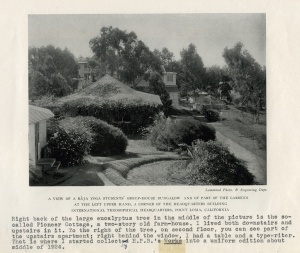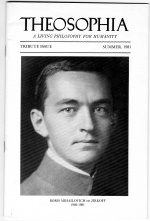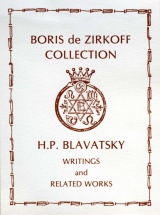Boris de Zirkoff: Difference between revisions
No edit summary |
No edit summary |
||
| Line 3: | Line 3: | ||
<br> | <br> | ||
<br> | <br> | ||
Boris de Zirkoff (1902–1981) was a relative of [[H. P. Blavatsky]] and the editor of her written works. He lived for many years in the [[Point Loma]] community, where he created and edited the periodical [[Theosophia (periodical)|''Theosophia'']]. | '''Boris de Zirkoff''' (1902–1981) was a relative of [[H. P. Blavatsky]] and the editor of her written works. He lived for many years in the [[Point Loma]] community, where he created and edited the periodical [[Theosophia (periodical)|''Theosophia'']]. | ||
== Early years == | == Early years == | ||
De Zirkoff was born in Petrograd, Russia <nowiki>[</nowiki>now known as Saint Petersburg<nowiki>]</nowiki> on [[March 7]], 1902. His mother was Lydia Dmitriyevna von Hahn.<ref>"Zirkoff, Boris de". ''Theosophical Encyclopedia''. Quezon City, Philippines: Theosophical Publishing Company, 2006. 688-689. Available at [http://theosophy.ph/encyclo/index.php?title=Zirkoff,_Boris_de Theosopedia],</ref> who was a second cousin to [[Helena Petrovna Blavatsky]]. His father was Mihail Vassilyevich de Zirkoff, a general in the Russian Imperial Army.<ref>John Cooper. "Last Link with H. P. Blavatsky Broken: Death of Boris de Zirkoff (1902-1981)." ''Theosophy in Australia'' 45.2 (June 1981): 232-233.</ref> | |||
He described his family relationship to [[Helena Petrovna Blavatsky]] in this way: | He described his family relationship to [[Helena Petrovna Blavatsky]] in this way: | ||
| Line 17: | Line 16: | ||
Modern genealogists would call this relationship "second cousin once removed." | Modern genealogists would call this relationship "second cousin once removed." | ||
As a boy | During his boyhood, he was tutored at home. He had an aptitude for languages, eventually mastering Russian, English, Swedish, German, and French, as well as the classics. As a boy in Russia, Boris was aware of his famous relative, but knew little of her. | ||
After moving to Sweden as a young man, he discovered ''The Secret Doctrine''. In one account, he found a Swedish translation in a library,<ref>John Cooper. "Last Link with H. P. Blavatsky Broken: Death of Boris de Zirkoff (1902-1981)." ''Theosophy in Australia'' 45.2 (June 1981): 232-233.</ref> but another version of the story tells that he first saw HPB's masterwork in the home of the Russian Consul.<ref>"Zirkoff, Boris de". ''Theosophical Encyclopedia''. Quezon City, Philippines: Theosophical Publishing Company, 2006. 688-689. Available at [http://theosophy.ph/encyclo/index.php?title=Zirkoff,_Boris_de Theosopedia],</ref> The [[Theosophical Movement]] was well established in Sweden at that time. De Zirkoff met [[Katherine Tingley]] during one of her European tours as head of the [[Universal Brotherhood and Theosophical Society]]. | |||
| Line 23: | Line 24: | ||
== Life at Point Loma == | == Life at Point Loma == | ||
Late in 1923, the 21-year-old de Zirkoff left Sweden to move to the [[Point Loma]] community | Late in 1923, the 21-year-old de Zirkoff left Sweden, where he was living in the home of Mrs. Wicander, to move to the [[Point Loma]] community at [[Katherine Tingley]]'s invitation. There he became acquainted with pupils of HPB including [[Henry T. Edge|Dr. Henry T. Edge]], [[Charles J. Ryan]], [[Reginald Machell]], and [[Herbert Coryn|Dr. Herbert Coryn]]. | ||
<br> | <br> | ||
<br> | <br> | ||
| Line 36: | Line 37: | ||
== Editorship of ''Theosophia'' == | == Editorship of ''Theosophia'' == | ||
[[File:Boris De Zirkoff on Theosophia cover.JPG|150px|left|Boris de Zirkoff on the cover of ''Theosophia'']]. | [[File:Boris De Zirkoff on Theosophia cover.JPG|150px|left|Boris de Zirkoff on the cover of ''Theosophia'']]. | ||
[[Theosophia (periodical)|'''''Theosophia''''']] was an independent quarterly periodical published in Los Angeles from May-June 1944 to Summer 1981. The final issue, pictured here, was a tribute to the recently deceased editor. | |||
<br> | <br> | ||
<br> | <br> | ||
Revision as of 02:51, 3 September 2013

Boris de Zirkoff (1902–1981) was a relative of H. P. Blavatsky and the editor of her written works. He lived for many years in the Point Loma community, where he created and edited the periodical Theosophia.
Early years
De Zirkoff was born in Petrograd, Russia [now known as Saint Petersburg] on March 7, 1902. His mother was Lydia Dmitriyevna von Hahn.[1] who was a second cousin to Helena Petrovna Blavatsky. His father was Mihail Vassilyevich de Zirkoff, a general in the Russian Imperial Army.[2] He described his family relationship to Helena Petrovna Blavatsky in this way:
Her father and my grandfather (my mother's father) were cousins. There was a considerable diference in age between the two branches of the family; hence I was born after HPB had died. This makes me something like a grand-nephew of HPB.[3]
Modern genealogists would call this relationship "second cousin once removed."
During his boyhood, he was tutored at home. He had an aptitude for languages, eventually mastering Russian, English, Swedish, German, and French, as well as the classics. As a boy in Russia, Boris was aware of his famous relative, but knew little of her.
After moving to Sweden as a young man, he discovered The Secret Doctrine. In one account, he found a Swedish translation in a library,[4] but another version of the story tells that he first saw HPB's masterwork in the home of the Russian Consul.[5] The Theosophical Movement was well established in Sweden at that time. De Zirkoff met Katherine Tingley during one of her European tours as head of the Universal Brotherhood and Theosophical Society.
Life at Point Loma
Late in 1923, the 21-year-old de Zirkoff left Sweden, where he was living in the home of Mrs. Wicander, to move to the Point Loma community at Katherine Tingley's invitation. There he became acquainted with pupils of HPB including Dr. Henry T. Edge, Charles J. Ryan, Reginald Machell, and Dr. Herbert Coryn.
Editorship of Theosophia
.
Theosophia was an independent quarterly periodical published in Los Angeles from May-June 1944 to Summer 1981. The final issue, pictured here, was a tribute to the recently deceased editor.
Collected Writings project
De Zirkoff's work received international recognition and cooperation from the major Theosophical organizations. In 1981 he was awarded the Subba Row Medal of the Theosophical Society (Adyar) to acknowledge his superb contributions to Theosophical literature.
Other writings
Archival legacy
Boris de Zirkoff left his fine library to the Henry S. Olcott Memorial Library of the Theosophical Society in America, where it is held intact in the Rare Books Room. His papers, including his correspondence and research files used in his work on H. P Blavatsky's collected writings and her letters, are in the Archives Department.
Notes
- ↑ "Zirkoff, Boris de". Theosophical Encyclopedia. Quezon City, Philippines: Theosophical Publishing Company, 2006. 688-689. Available at Theosopedia,
- ↑ John Cooper. "Last Link with H. P. Blavatsky Broken: Death of Boris de Zirkoff (1902-1981)." Theosophy in Australia 45.2 (June 1981): 232-233.
- ↑ Letter to Gertrud Bäzner. July 30, 1969. Boris de Zirkoff Papers. Record Series 22. Theosophical Society in American Archives, Wheaton, Illinois.
- ↑ John Cooper. "Last Link with H. P. Blavatsky Broken: Death of Boris de Zirkoff (1902-1981)." Theosophy in Australia 45.2 (June 1981): 232-233.
- ↑ "Zirkoff, Boris de". Theosophical Encyclopedia. Quezon City, Philippines: Theosophical Publishing Company, 2006. 688-689. Available at Theosopedia,


